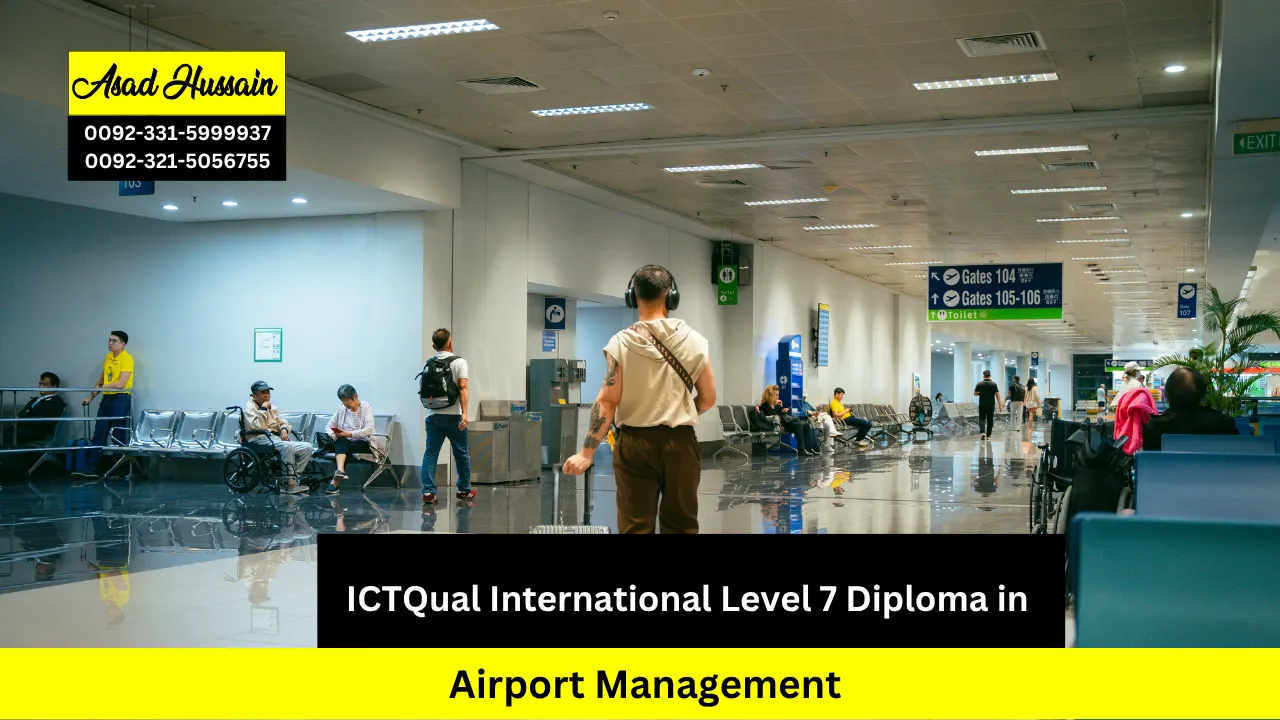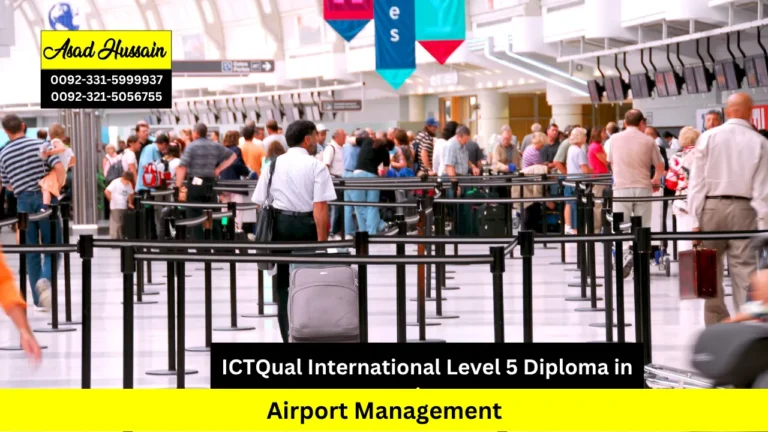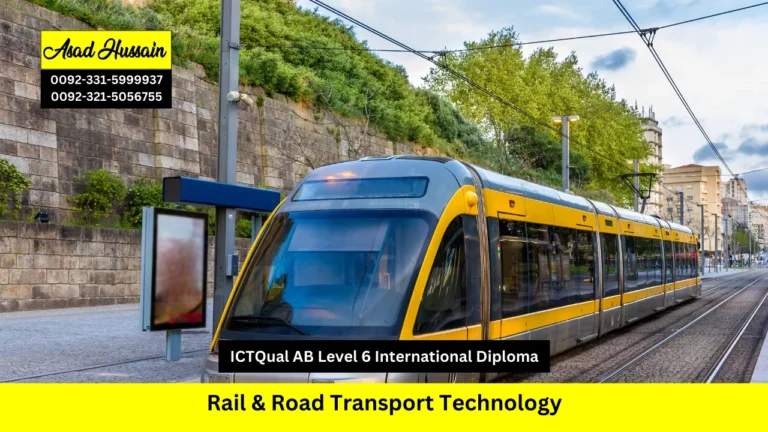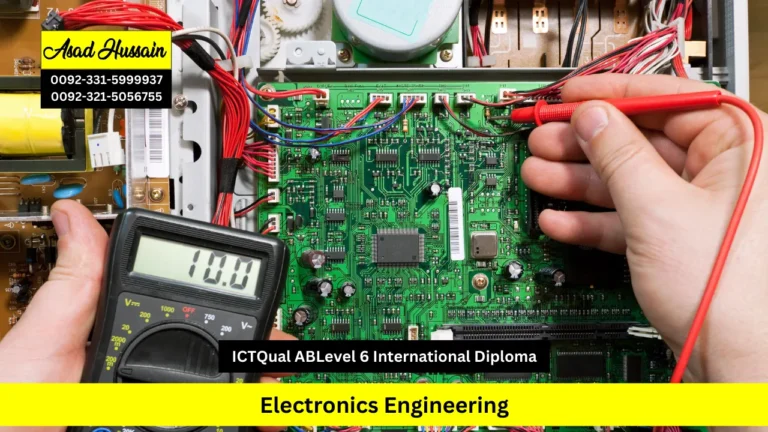The ICTQual International Level 7 Diploma in Airport Management is a premier qualification tailored for professionals seeking leadership roles in the aviation sector. This advanced diploma focuses on strategic airport operations, regulatory frameworks, and global aviation standards, making it ideal for individuals aiming to manage complex airport systems or influence aviation policy at the highest level.
Learners gain in-depth knowledge across key areas such as airport planning, financial management, safety and security oversight, and stakeholder coordination. The curriculum emphasizes analytical thinking, decision-making, and leadership skills required to navigate the challenges of modern airport environments. It also integrates sustainability practices and technological innovation to prepare graduates for future-focused roles.
Designed for experienced professionals and ambitious learners, this diploma supports career progression into senior management, consultancy, and regulatory positions. Whether you’re currently working in aviation or transitioning from a related field like logistics or transportation, the Level 7 Diploma equips you with the tools to lead with confidence and competence.
With global recognition and industry relevance, the ICTQual International Level 7 Diploma in Airport Management opens doors to executive opportunities in airport authorities, airline operations, and aviation governance. It’s more than a qualification—it’s a strategic investment in your future as a leader in one of the world’s most dynamic industries
Program Highlights
Mandatory Units
This qualification, the ICTQual International Level 7 Diploma in Airport Management, consists of 6 mandatory units.
- Strategic Leadership and Corporate Governance in Airport Management
- Global Airport Economics and Policy Analysis
- Advanced Risk, Safety, and Security Management in Airports
- Airport Strategy, Innovation, and Change Management
- Sustainable Development and Future Challenges in Airport Operations
- Dissertation / Applied Research Project in Airport Management
The ICTQual International Level 7 Diploma in Airport Management is a high-level qualification designed for professionals aiming to lead and innovate in airport operations. It offers advanced training in strategic planning, aviation safety, financial management, and global regulatory standards—ideal for those pursuing senior roles in the aviation industry.
- Minimum Age: Learners must be 21 years of age or older at the time of enrolment.
- Educational Qualification: A Level 6 qualification (e.g., bachelor’s degree or equivalent diploma) in aviation, business, or a related field
- Industry Experience: Prior work experience in aviation or airport operations is highly recommended
- English Proficiency: A good command of English is essential; some providers may require IELTS/TOEFL scores
- Access to Technology: Learners should have access to a computer or device with internet for online modules and assessments
- Supporting Documents: May include CV, academic transcripts, and proof of experience depending on the provider
- Motivation and Commitment: A strong interest in strategic airport management and leadership roles is expected
Learning Outcomes for the ICTQual International Level 7 Diploma in Airport Management:
Strategic Leadership and Corporate Governance in Airport Management
Learners will:
- Understand advanced leadership theories and their application in airport management.
- Analyse governance structures and decision-making processes within international airports.
- Develop strategic leadership skills for managing complex airport operations.
- Evaluate ethical considerations and corporate responsibility in airport governance.
- Implement frameworks for accountability, transparency, and operational excellence.
- Apply change management principles to drive organisational performance.
- Strengthen communication and stakeholder engagement skills at senior management levels.
- Lead cross-functional teams to achieve strategic objectives in global airport environments.
Global Airport Economics and Policy Analysis
Learners will:
- Examine the economic principles influencing airport operations and revenue generation.
- Analyse the impact of global aviation policies, regulations, and market trends.
- Evaluate financial management and investment strategies in the airport sector.
- Develop skills to assess airport performance and economic viability.
- Understand the role of international treaties and regulatory bodies in shaping airport operations.
- Apply economic and policy analysis to strategic decision-making.
- Explore revenue optimisation and cost management techniques for sustainable growth.
- Assess global aviation trends and their implications for airport strategy and competitiveness.
Advanced Risk, Safety, and Security Management in Airports
Learners will:
- Identify, assess, and manage operational, financial, and strategic risks in airports.
- Develop crisis management and emergency response plans aligned with international standards.
- Analyse security management frameworks for airside, landside, and passenger operations.
- Implement risk mitigation strategies to enhance airport resilience.
- Evaluate compliance with safety regulations, aviation law, and industry best practices.
- Apply data-driven approaches to monitor and improve risk management systems.
- Understand the role of leadership in promoting a safety and security culture.
- Assess case studies of incidents to inform continuous improvement in airport safety and security.
Airport Strategy, Innovation, and Change Management
Learners will:
- Develop strategic planning skills to align airport operations with organisational objectives.
- Evaluate innovative approaches to optimise efficiency and passenger experience.
- Implement change management techniques in complex airport environments.
- Analyse the impact of emerging technologies on airport operations and management.
- Integrate digital transformation and smart airport solutions into strategic planning.
- Foster a culture of innovation and continuous improvement within airport teams.
- Assess the effectiveness of strategic initiatives and organisational change projects.
- Apply forward-thinking solutions to address operational, financial, and technological challenges.
Sustainable Development and Future Challenges in Airport Operations
Learners will:
- Understand sustainable airport planning, environmental management, and carbon reduction strategies.
- Evaluate future challenges in aviation, including climate change, technological disruption, and globalisation.
- Develop strategies to balance operational efficiency with environmental responsibility.
- Apply international sustainability standards and best practices in airport operations.
- Assess the role of innovation in achieving sustainable airport development.
- Promote stakeholder engagement to implement sustainability initiatives.
- Analyse long-term trends affecting airport infrastructure, policy, and management.
- Demonstrate leadership in driving sustainable practices across all areas of airport operations.
Dissertation / Applied Research Project in Airport Management
Learners will:
- Conduct independent research addressing complex challenges in airport management.
- Formulate research questions and objectives aligned with strategic industry needs.
- Apply appropriate qualitative and quantitative research methodologies.
- Analyse data and interpret findings to inform practical solutions.
- Develop critical thinking and problem-solving skills through applied research.
- Present research outcomes professionally to academic and industry audiences.
- Evaluate ethical considerations and ensure compliance in research activities.
- Integrate research findings into strategic recommendations for real-world airport management applications.
The ICTQual International Level 7 Diploma in Airport Management is a prestigious qualification tailored for professionals aiming to lead in the global aviation industry. It’s designed to equip learners with advanced knowledge in airport operations, strategic planning, and regulatory compliance. Here’s a breakdown of who this course is ideal for:
1. Senior Aviation Professionals
- Individuals already working in airport or airline management
- Professionals aiming to move into executive or strategic roles
- Managers seeking formal recognition of their expertise
- Those responsible for airport planning, operations, or compliance
- Aviation leaders looking to expand their global knowledge
- People managing teams or departments within airport systems
- Decision-makers involved in aviation policy or infrastructure
2. Mid-Career Aviation Staff
- Employees with several years of experience in aviation operations
- Supervisors and coordinators ready to step into leadership roles
- Staff seeking promotion within airport authorities or airlines
- Individuals wanting to deepen their understanding of strategic airport functions
- Professionals aiming to specialize in areas like safety, finance, or logistics
- Those preparing for advanced certifications or postgraduate studies
- Learners looking to formalize their experience with a recognized diploma
3. Aviation Consultants and Analysts
- Consultants advising airports or aviation organizations
- Analysts working on aviation data, policy, or performance
- Professionals involved in airport audits or regulatory reviews
- Individuals supporting aviation projects or infrastructure development
- Experts seeking to enhance their credentials for client-facing roles
- Those involved in aviation research or strategic planning
- Advisors working with government or international aviation bodies
4. Career Changers with Management Experience
- Professionals from logistics, transport, or hospitality transitioning into aviation
- Managers from other industries seeking a new challenge
- Individuals with transferable leadership skills
- Those interested in applying business acumen to airport operations
- Career changers looking for a globally respected qualification
- People passionate about aviation but lacking formal training
- Mid-career professionals aiming to enter a high-growth sector
5. International Learners and Expats
- Aviation professionals working abroad or planning to relocate
- Learners seeking a qualification recognized across borders
- Expats aiming to work in airport management in a new country
- Individuals preparing for roles in international aviation organizations
- Students wanting to understand global airport standards and practices
- Professionals targeting multinational aviation careers
- Those interested in cross-cultural aviation leadership
6. Entrepreneurs and Aviation Start-Up Founders
- Individuals launching aviation-related businesses or services
- Founders of airport tech, logistics, or passenger experience startups
- Entrepreneurs needing strategic airport management knowledge
- Business owners expanding into aviation infrastructure or services
- Innovators seeking to align with global aviation standards
- Those building partnerships with airports or airlines
- Leaders aiming to disrupt traditional airport models with new solutions
7. Postgraduate Learners and Researchers
- Graduates pursuing advanced studies in aviation or transport management
- Researchers exploring airport systems, sustainability, or innovation
- Students preparing for PhD-level work in aviation policy or planning
- Individuals interested in academic careers in aviation
- Learners seeking a rigorous, research-informed curriculum
- Those aiming to publish or present in aviation forums
- Scholars wanting to combine theory with real-world airport challenges







